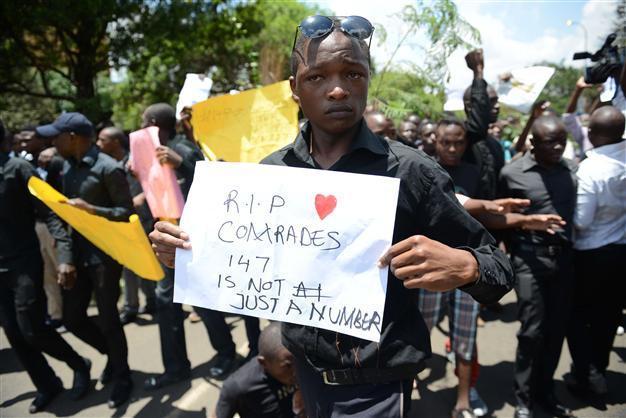Five Kenyans, one Tanzanian held over university massacre: court
NAIROBI - Agence France-Presse

Kenyans take part in a march demanding greater national security on April 7, 2015, following last week's massacre by Somalia's Shebab Islamists, ahead of a candlelit vigil on the final day of mourning for the 148 people killed by the militants. AFP Photo
A Nairobi court on April 7 ordered five Kenyans and a Tanzanian to be detained for 30 days while police investigate possible connections to last week's university massacre.
The court agreed to state lawyers' request for the extended detention period, which usually would last 24 hours before the detainee has to be presented in court. The Tanzanian suspect is still being held in the northeastern town of Garissa, where the massacre of 148 people took place.
The day-long siege was claimed by Somalia's Al-Qaeda-linked Shebab insurgents, and was Kenya's deadliest attack since the 1998 bombing of the US embassy in Nairobi.
Lawyers for the police said the five Kenyans were being investigated for supplying weapons to the attackers who carried out the killings on Thursday, without giving further details.
One of men was arrested on the university campus where he was a security guard. The others were arrested while trying to cross the border to Somalia.
The Tanzanian man was found "hiding in the ceiling" of the university campus holding grenades, interior ministry spokesman Mwenda Njoka has said.
Police are studying phone records of the men believing it shows they were in contact with the four gunmen who carried out the attack and were killed by Kenyan troops.
Authorities on Sunday named one of the four gunmen killed as a fellow Kenyan citizen, highlighting the Shebab's ability to recruit within the country.
Abdirahim Abdullahi, an ethnic Somali, was a university law graduate described by those who knew him as an A-grade student and "a brilliant upcoming lawyer", Njoka said.
Although losing ground in Somalia, the Shebab have stepped up attacks inside Kenya as well as its recruitment of Muslim youth in the country's northeastern and coastal regions.
A $215,000 (200,000 euro) bounty has been offered for alleged Shebab commander Mohamed Mohamud, a former Kenyan teacher believed to now be in Somalia and said to be the mastermind behind the Garissa attack.
